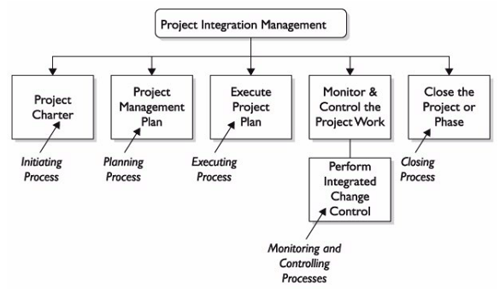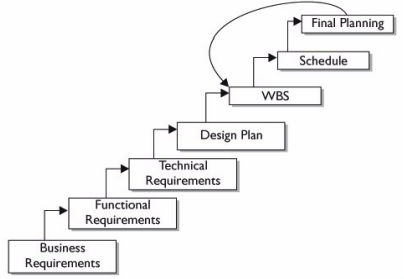Version [18018]
Dies ist eine alte Version von PimPsm erstellt von RonnyGertler am 2012-12-06 17:39:40.

Project Integration Management & Scope Management
Project Integration Management
Project integration management is the heart of project management and is made up of the day-to-day processes the project manager relies on to ensure that all of the parts of the project work together. PIM gears the project work together.

Developing the Project Charter
The point of the charter, other than authorizing the project and the project manager, is to officially launch the project and allow the project manager to go about the business of getting the project work planned and then finished.
Developing the Project Charter
Project requirements for satisfaction The charter must identify what it'll take to complete the project - in other
words, it should identify the metrics for success.
Project approval requirements The project charter needs to clearly state what it takes for the project to be successful and who signs off on project deliverables, project decisions, and project completion.
Project manager The project charter defines who the project manager is and what level of power the project manager has in the project.
Project sponsor The project charter defines who the project sponsor is; if the project sponsor is not the person signing the project charter, it should define who is authorizing the project (it's almost always the project sponsor who signs the charter).
The big picture The charter should identify the high-level purpose of the project, the business need the project aims to accomplish, and/or the product requirements the project will create.
Project purpose The charter needs to answer why the project is being launched and why it's important to the organization.
Milestone schedule Milestones are timeless events that show the progress within a project.
Stakeholder influences The charter needs to identify the stakeholders who will influence the project.
Risks Any of the known risks should be referenced in the project charter.
Functional organizations Functional organizations, such as departments, communities, agencies, and other stakeholders, should be identified and their expected level of participation should be addressed.
Summary budget The charter should have a summary budget.
Developing the Project Plan
The project plan guides the project manager through the execution and monitor and control process groups. The project plan is designed to control the project. As a whole, the point of the project plan is to communicate to the project team, stakeholders, and management how the project will be managed and controlled.
Example: evolution of the planning to action process for a typical technology project

The project plan is actually a bunch of plans and documents:
- Project Scope Management Plan
- Project Change Management Plan
- Schedule Management Plan
- Cost Management Plan
- Quality Management Plan
- Process Improvement PlanDeveloping the Project Plan
- Human Resources Plan
- Risk Management Plan
- Communication Management Plan
- Procurement Management Plan
Executing the Project Plan
The project manager and the project team will go about completing the promises made in the project plan to deliver, document, measure, and complete the project work. The project plan will communicate to the project team, the stakeholders, management, and even vendors what work happens next, how it begins, and how it will be measured for quality and performance.
The product of the project is created during these execution processes. The largest percentage of the project
budget will be spent during the project execution processes. The project manager and the project team must
work together to orchestrate the timings and integration of all the project's moving parts. A flaw in one area of
the execution can have ramifications in cost and additional risk, and can cause additional flaws in other areas
of the project.
Leider enthält die Kategorie PimPsm keine Elemente
CategoryPmMa
Diese Seite wurde noch nicht kommentiert.





